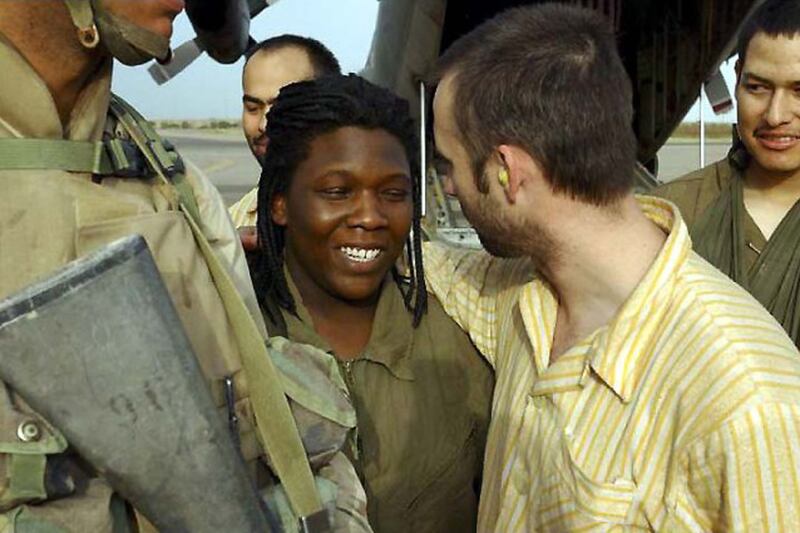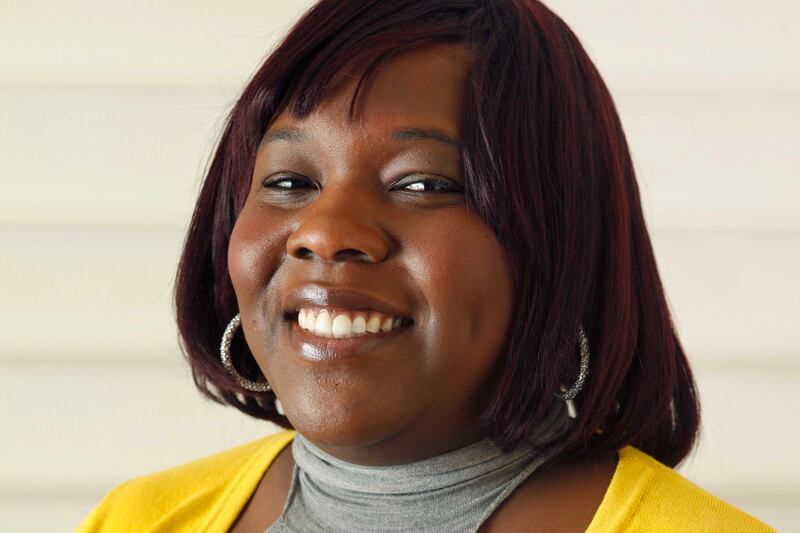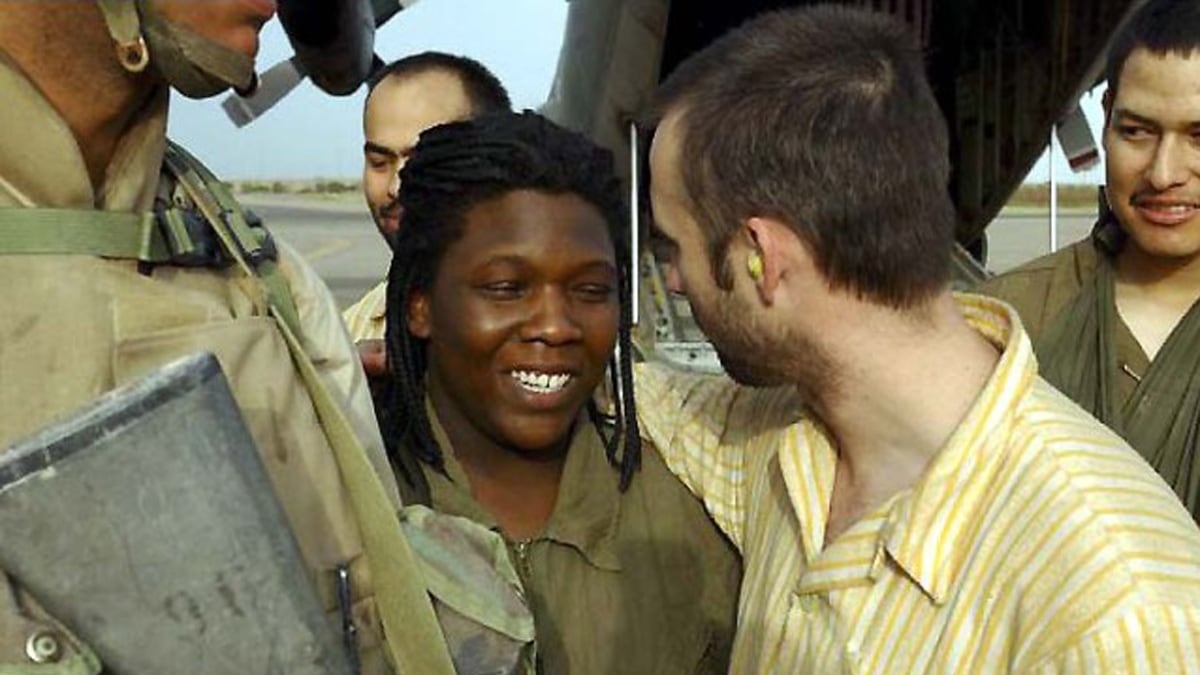Shoshana Johnson joined the Army with dreams of becoming a chef. Her plan: to cook for soldiers and earn some money for culinary school. Five years later, she found herself lying on the ground in Iraq, struggling to protect her head as a group of Iraqi men kicked her repeatedly in the stomach, face, and bullet-torn legs. She remembers their triumphant shouts.
It was the start of the war, in March 2003, and her unit was under attack after making a wrong turn into the city of Nasiriyah. A 30-year-old mother of a toddler at the time, Johnson became a prisoner of war, along with four men from her unit. Two women—Jessica Lynch and Lori Piestewa—were captured separately. A badly injured Lynch was rescued by U.S. forces nine days later. Piestewa didn’t survive. Johnson and the men were rescued along with two helicopter pilots after 22 days.
It was an ordeal that Johnson, now living in her hometown of El Paso, Texas, still struggles to put behind her, while she moves forward with her life. As the U.S. troops pull out of Iraq, we checked in.
You were held hostage in various jails and homes around Baghdad, kept apart from the men. Did you think you would get out alive?
I went back and forth. Some days I would think, I’m going home. Then I’d hear a bomb blast or gunfire really close. The U.S. was bombing the daylights out of Baghdad. One time a bomb shook the house—there was a deafening boom, and I thought we would die. I could hear the guys through the walls, and that helped. We would all call out to each other, checking in. “Joe, are you OK?” “Patrick, are you OK?” Those 22 days were hard—I don’t know how people survived for eight or nine years in captivity in Vietnam. You’re accustomed to your freedom. You have to rely on someone just to take you to the bathroom.

How did you survive with bullet wounds to your legs?
The bullets had gone through and through, and at the time of the ambush, with all the adrenaline, I didn’t really feel the shots at all—just a burning sensation. Later, in captivity, I felt it. The guards actually cleaned me up, and brought me to a hospital to operate. They put me under with a general anesthesia.
So the guards treated you decently?
Some of the guards were helpful, as long as you weren’t combative. They gave one guy, Patrick, a really hard time, because he was singing that Toby Keith song, the one that goes, “Don’t mess with the U.S. of A. We’ll put a boot in your ass.” They beat him up, and took his wedding ring. That really made him mad. I would shout at them to just leave him alone. Looking back, I realize there were moments when I was just arrogant. One day they brought me this breakfast, this mush. I was like, I’m not eating it. They could have stopped bringing me any food at all.
When U.S. troops came to the rescue, on a tip, you didn’t know at first who they were.
No, all I heard was the door being kicked in, and I thought, Oh crap. Then I heard clear English. It was the Marines. They got us out of there. I couldn’t run on my legs, so one of them dragged me out.
You’ve struggled with posttraumatic stress disorder over the years. How are you doing now?
I go to therapy on a regular basis, and I’m learning coping mechanisms. I have certain triggers, like when I see war scenes on TV—the military, uniforms, Iraq. If I watch that, I’ll have a flashback later. It feels like I’m living through the experience all over again. The other night NBC was interviewing Iraqi generals. The uniforms, the men in their bushy mustaches…I found myself looking at them closely, to see if one of them was one of my guards. Then I told myself, turn it off. Everyone keeps on talking about that show Homeland—about a POW who comes home and people think he’s a terrorist. I’ll never watch that.
The therapy has helped me cope, day to day. I’m getting better; I don’t have as many nightmares. Part of my problem was that I had a lot of guilt. I felt guilty for being here when others died. I felt like I could have stopped all this from happening. A day before the attack, I had a bad feeling in my stomach—I just felt like something bad was going to happen. I felt like I should have said something. Of course, I could not have stopped that convoy from moving forward by telling a commander I had a bad feeling. I was the cook. What’s he going to say? “Stop the convoy. The cook isn’t feeling it. Let’s just stop right now.” I don’t think so.
Was it hard for you to admit that you had PTSD?
Yes, the way it is in the military, you’re supposed to suck it up, keep going. But it’s important to get help. A couple weeks ago, a soldier shot a woman here. He had done a couple tours in Iraq and Afghanistan. We had another shooting last year. It’s a real issue. I know the VA and the military are shorthanded on psychiatrists.

The military didn’t want to concede at first that you had PTSD, correct?
Yes, the doctors diagnosed it and were treating me for it. But when I was getting medically dismissed, the military didn’t want to acknowledge that I still had it. I needed them to say it. It became very important to me. Eventually they did—but it took a while.
What are you up to now?
I finished my associate’s degree in culinary arts at El Paso Community College this past spring. Now I’ve started studying for a bachelor’s degree in health sciences and nutrition at the University of Texas. I’m not where I thought I’d be at 38, but I’m grateful to be here.
How are you doing physically?
I was shot in both legs, so there’s quite a bit of damage: nerve damage, scar tissue. I have arthritis in my back and spine. I go to physical therapy still. But I’m fortunate. A lot of young men and women have prosthetic limbs. I can even dress up in heels every now and then.
How do you feel about the troops coming home from Iraq?
I’m very happy to see them coming home, closing that chapter. I’m sure some of them will have to deal with the mental aspects for some time to come. Some of us leave Iraq physically, but not mentally.
You wrote a memoir, I’m Still Standing, a couple years ago, saying you wanted to set the record straight. What was it that you wanted to clear up?
I had so many people tell me what they thought happened to me over there, I decided to tell them myself. A lot of people can accept that a man goes to war and does what is necessary, but they have a hard time accepting that a woman can. They’ll say, “But you didn’t see any action.” Well, I have bullet holes in my legs. I fired my weapon. I’ve talked to other military females who have said the same thing: people don’t believe they’re in the middle of the action. Basically I did the book when I felt I could get a handle on going back and reliving it all. When the book came out, there was some backlash. I talked to Jessica Lynch about it and she said, “It doesn’t matter—we know what happened.”
What is it like to come home after being a POW? Do you turn on the TV and see ads for whitening toothpaste and fluffy toilet paper, and think, everything here is so trivial here?
Oh, I have frivolous thoughts just like anyone. Of course there are extremes here, like the Kardashian situation. Sometimes I look at all the stuff going on with her, and I want to say, girl, we’ve got bigger things to worry about. But I’m no better than anyone else. I think about frivolous things all the time. The hard part is when people look at you funny when they hear you’re a POW. That can be rough. They look at you like they expect you to go nuts at any second and start shooting at everything.
Jessica Lynch’s rescue was so hyped that when you were rescued later, did you feel a bit forgotten?
No, we saw a lot of hooplah. We weren’t trying to compare anything. Actually I think the guys get forgotten all the time now. There were six guys in captivity. I’m on touch with them all still: David Williams, he’s a pilot stationed here in Texas. Ronald Young, he’s also a pilot, in Alabama. James Riley, he’s retired. Joseph Hudson, he’s retired too; he lives here in El Paso. Patrick Miller, he’s in Kansas, still active. Edgar Hernandez, he’s a police officer in Texas. He was the baby, like 20, when we were captured. I’m still in touch with some of the Marines who rescued us too. One of them held onto me so tight after we were rescued, while I was crying hysterically. I talk to him on a regular basis. These guys are stuck with me.





